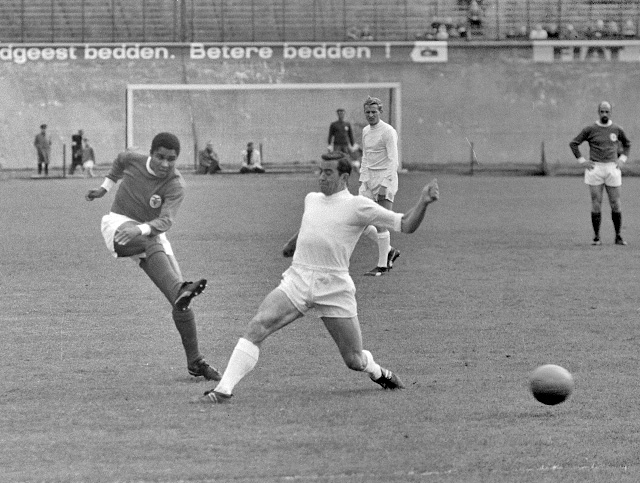Eusébio da Silva Ferreira, GCIH, GCM, (January 25, 1942 – January 5, 2014) is considered to be Portugal’s most renowned player and one of the first world-class strikers. He scored a total of nine goals while leading Portugal to a third-place finish in the 1966 World Cup.
 Eusébio kicking the ball in 1965
Eusébio kicking the ball in 1965Eusébio was born in Mozambique, which was at the time was a Portuguese colony. As a teenager, Eusébio joined Portugal’s Benfica Club and helped the team win 11 league titles and the 1962 European Cup. He was even honored by Benfica as one of the 20th century’s top players, making him a statue and created an annual Eusébio Cup. He became an ambassador for football after his retirement until his death. On January 5, 2014, the soccer legend died of heart failure at the age of 71.
Greatest Sporting Achievements
Eusébio is the Portuguese club’s all-time top scorer with 638 goals scored in 614 official games, won 11 Primeira Liga titles, 5 Taca de Portugal titles, the eighth highest goal scorer in European Cup history and the second highest behind Alfredo DI Stefano in pre-Champions League era with 48 goals.
Eusébio is in the ninth spot in the International Federation of Football History and Statistics’ poll of the 20th century’s top player.
He was given the UEFA President’s Award, PFA Merit Award and many others. Eusébio is part of the FIFA International Football Hall of Champions, received FIFA Order of Merit and Ballon d’OR.
Why Was He So Good?
Eusébio is the most famous name in the history of Portuguese football. As a legendary center-forward and a world-class striker, he was blessed exceptional acceleration, skills, performance, athleticism and vicious right-footed shots, making him a prolific goal scorer.
What You May Not Know
- Eusébio was only 19 when debuted for Benfica in 1961.
- He was nicknamed “Pantera Negra” (Black Panther) and “Perla Negra” (black pearl) by the fans.
- Eusébio was known for his “cat-like” dribbles which he practiced perfectly in the street games of his childhood.
- He has been called “Africa’s first great footballer” and “Africa’s greatest-ever player”.
Was he a legend?
Do you agree with Eusébio being a legend of football / soccer?
How would you rate their greatness? (from good to 'the best')
Related Pages
- Eusébio won the Ballon d'Or in 1965
- More football players
- About Football (Soccer)
- Athlete Database home
- About Sport in Portugal


 Current Events
Current Events